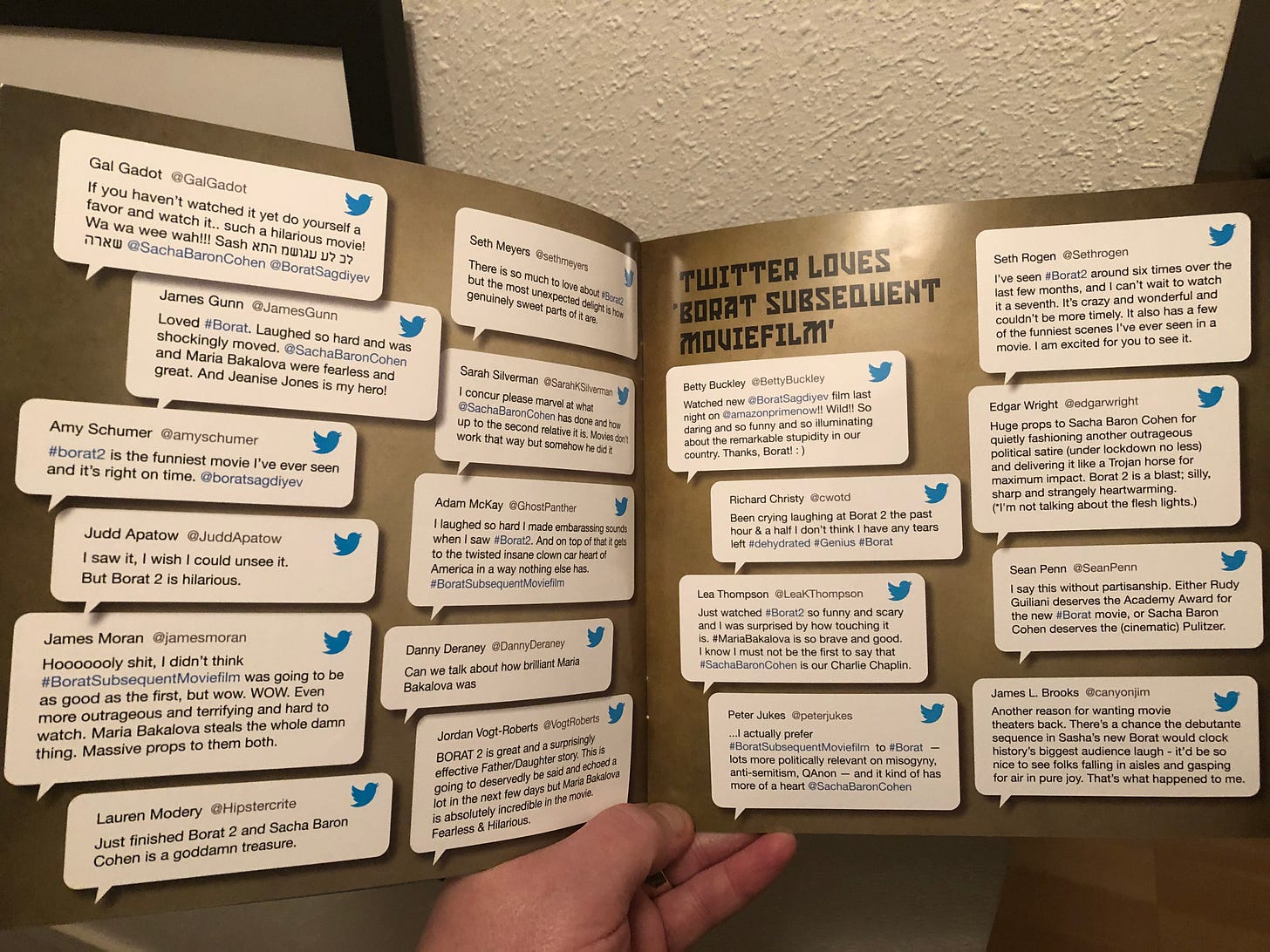Post for Make Benefit Glorious Substack Readers & Jeff Bezos
And after the Borat, a Happy New Year from me and MY WIFE!
There’s a moment in the waning hours of the Sopranos’s six-season run when Tony’s daughter, Meadow, visits her brother Anthony Jr. as he sits in his room in the midst of a major depressive episode. She tries to lift his spirits by telling him that she has just re-watched Borat, and gigglingly recounts the scene in which the eponymous Kazakh documentarian, played by Sacha Baron Cohen, returns to a dinner party carrying his turds from a trip to the bathroom.
“It wasn’t fair to the people involved,” says A.J. humourlessly, in a way that suggests he is looking for a reason to disapprove of the movie. Meadow counters that he loved it when it came out.
The scene is a disorienting one for Sopranos viewers, because it’s Meadow who typically deploys the scolding language of righteous indignation (even — maybe especially — when it comes to evading moral responsibility for the sources of her father’s money and power), and A.J. is the giggling, nihilistic idiot. A little while after his Borat denunciation, A.J. self-seriously announces to his parents his intention to learn Arabic and join the War on Terror, with the long-term goal of pivoting to becoming Donald Trump’s personal helicopter pilot. By the end of the series, Tony has prevented his son from enlisting in the armed forces (the decision that initially and, through flashback, conclusively separated Vito and Michael Corleone in The Godfather) and gotten him a job working for a pornographer, Little Carmine (another very stupid character named after his mob boss father), and when we see A.J. on the couch with his girlfriend, tittering at a viral video of George W. Bush and Karl Rove dancing, we know that everything is back to normal. Unfortunately, after the rest of us finished laughing at the bumpkins and hillbillies that peopled the first Borat movie, things didn't go the same way.
A couple of years ago, owing to a contract for a co-writing job on a screenplay for some very nice producers in Los Angeles, I was able to parlay my membership in the Writers Guild of Canada (a union affiliation reflective, in my case, almost exclusively of work for public radio) into a membership in the slightly-more-storied ranks of the Writers Guild of America. For a socialist cinephile, this felt like a pretty magical accession, and on a trip to the union’s offices in LA I gazed in wonder at the bound scripts in the guild’s library and giddily snapped a photo of the photo on the wall of Dalton Trumbo at his typewriter, in the bathtub. If my new union membership failed to result in any sudden status as a Hollywood insider, or even present any opportunities for romantic, solidaristic deli tête à têtes with my fellow blacklisted showbiz radicals, it did put me on the mailing list for every studio in Hollywood and their awards season campaign literature, which is how I came to be in possession of a document, purporting to be from the Kazakhstan Ministry of Culture, called Borat: Guidings to Smash Hit Moviefilm From Glorious Year 2020 — Amazon Studios’s “For Your Consideration” booklet for the film. On the cover, a blurb from the New York Times declares Borat: Subsequent Moviefilm “THE BEST FILM OF THE YEAR” — a statement which, if true, means 2020 really was as bad as everyone keeps saying.
Comedy is, as conventional wisdom holds, subjective; furthermore, there is no way for a Canadian nobody stand-up comedian trying to scrape together a few bucks on Substack during an economic extinction event to criticize the output of one of the English-speaking world’s most successful comic minds without looking at least a little bit pathetic. The Guidings pamphlet includes splash pages of pull-quotes from prestige media and celebrity Twitter accounts full of language so superlative it’s hard to read without pulling a muscle, and I can offer no compelling, objective reason why my experience of the film as mostly mirthless, meandering, cheap, cynical, and browbeating is any more valid than theirs. That’s one of the great things about comedy.
Here, though, are some objective facts: by mid-fall of last year, twenty thousand Amazon employees had been infected with Covid-19. In the pages of the Guardian, the former US Secretary of Labor writes that as Amazon founder Jeff Bezos’s already indefensible fortune expands caligulously during the pandemic, his terrified employees are being shouted down for raising health and safety concerns. An Amazon employee in Canada told the National Post: “There is no social distancing, there is no sanitation. Many of them, 99 per cent of them, are scared of working there. But they have no choice.” So, given those realities — what does it mean to make a movie, for Amazon, mocking the dumb but powerless neck-bearded hicks at an anti-masking rally? And what does it mean that the cultural and media elite, for whom the mantra ‘Punch Up, Never Down’ is meant to be a shibboleth, are lapping it up?
The answers to these questions — who is Borat, or Borat, aimed at, and in whose interests? — are by no means obvious. I’d venture that if any other gonzo documentary male filmmakers pranked a women’s political gathering by sending a character to the podium to deliver a graphic description of her first experience of masturbation, making use of the c-word, the social media opprobrium would have been good for half a week’s news cycle. But because these women were Republicans, they’ve waived their rights not to have their meeting hijacked by narrations of bathroom cubicle clitoral stimulation, and we can see-you-next-Tuesday guilt free. Just as we can all agree that there’s nothing worse one could do, in 2020, than to break lockdown orders and declare, publicly, that the coronavirus was a hoax — but that when Baron Cohen does it as Borat, encouraging the rednecks who have temporarily taken him in to bring him to a “Freedom Rally” where he declares the virus a conspiracy from the stage and leads the crowd in a song of mounting violent imagery, it’s social commentary. There’s a certain brand of contemporary liberal that wants this kind of bad speech and disinformation taken off of the easily-accessible internet completely, so soon this type of irony may only be an option for those who have a sponsor like Amazon with them to vouch for the purity of their intentions.
When Sacha Baron Cohen denounced Facebook in a video that went viral a little while back — and, let me be clear: as an anti-social media evangelist, I agreed with a great many of the problems he identified, if very few of the implied solutions — the paradox was vertiginous. Was this the guy who used three different aliases and accents in order to land interviews under false pretences denouncing anonymity and disinformation? Was Hollywood’s prankster god of chaos and disruption really weighing in on the side of rappel à l’ordre? When the original Borat came out in 2006, a year before social media went mainstream, Baron Cohen’s critics weren’t sure that popular audiences could be trusted to understand the levels of irony and ambiguity packed into moments like the titular goofball’s singing “Throw the Jew Down the Well” with the eager participation of the clientele at a country-western bar. A decade and a half into our Hobbesian social media nightmare, figures like Baron Cohen want to make sure that all carnivalesque anarchic bedlam is handed down from on high, in organized fashion. He is speaking truth from power.
In the interviews with Baron Cohen that fill the Guidings booklet, the vision he articulates for the film is touching — “We hoped we could remind the audience that those we disagree with aren’t that dissimilar to ourselves” — as well as bafflingly out of tune with what we see on screen, such as the baker who blithely ices an anti-Semitic message onto a chocolate cake (at least it’s not for a gay wedding!) or the purveyor of farmyard equipment who tells Borat what size of propane tank he might need in order to eliminate “Gypsies.” From the interviews, we also get a glimpse of Baron Cohen’s ambitions for his artwork:
[S]eeing as our aim was to get people to vote, we knew women would have to come out in large numbers and vote against this misogynistic president. We hoped one way to accomplish that goal was to unite Borat — the most misogynistic character in cinematic history — with the daughter he didn’t know he had, Tutar, and she would discover the misogyny and oppressiveness of the patriarchal system that she has been brought up with.
For those at home keeping score, trying to figure out how it is that the American culture wars always come out so pear-shaped, that’s the movie star Cambridge-graduate multimillionaire who became world famous getting unsuspecting yokels to say horrible things on camera using the language of a Democratic Party pollster to describe the emancipatory gender politics of the movie he’s making for one of the world’s most powerful and devastating corporations, run by the globe’s second-richest man. Wawa weewa!
When Baron Cohen made The Dictator (2012), he consciously inserted himself into the line of descent from Charlie Chaplin, whose first talkie was The Great Dictator, an anti-fascist picture. In The Great Dictator (1940), Chaplin played two characters: a Jewish barber in the ghetto, and Adenoid Hynkel, “der fooey" of the country of Tomania and the barber’s exact physical double. Ever since the days of his WWI-era shorts, Chaplin had been fascinated with the idea of doppelgängers, whether in The Floorwalker (1916) or The Idle Class (1921), and The Great Dictator obviously played on the superficial aesthetic likeness between Chaplin and Hitler in their toothbrush moustaches. But implicit in Chaplin’s act of twinning with Hitler was also a recognition of the role he might have played, however small, in helping to shape the mass media, image-driven world in which the fascist leader thrived. In the film’s closing scene, the barber, dressed as Hynkel, approaches a microphone in front of massed ranks of stormtroopers and breaks the fourth wall, becoming Chaplin, and delivering a heartfelt plea for empathy, solidarity, and democracy.
Borat: Subsequent Moviefilm lands on somewhat of a similar closing note, but without ever having challenged its audience’s comfortable moral certainty, or its own central character’s role, however minor, in helping to ring in the era of zany nihilism in which Donald Trump could be first a plausible candidate, then US president.
A.J. Soprano — not to mention an army of Daily Show and SNL viewers, and fans of the White House correspondent’s dinner — chortled at the twilight of the George W. Bush and Karl Rove era, and the failure to reckon seriously with those years helped bring us all to where we are now. Are the Americans, and we cultural satellites, in danger once again of — in a phrase originally attributed to Peter Cook, in reference to the British — “sinking giggling into the sea”? In a weird sort of paradox, we live in an era that is uniquely fusty and prim, priggish and quick to chide — and then, when the proverbial viral spike protein hits the cellular wall, prone to falling back on smug, deeply self-satisfied inside joking.
I don’t like!
It has been a really, really difficult winter — so from the bottom of my heart, from my family to yours, I wish you a very Happy Year of the Ox — let’s hope it sees a precipitously steep decline in the number of anti-Asian hate crimes, and an inversely steep incline in the prosperity of presently hard hit Chinatown businesses. And let’s hope that the humble ox — that strong and noble beast of burden that our species has been able to depend on for forward motion for thousands of years — can pull us all out of the mire we’re in. Gooooooo Ox!








Happy Year of the Ox to you and your family as well